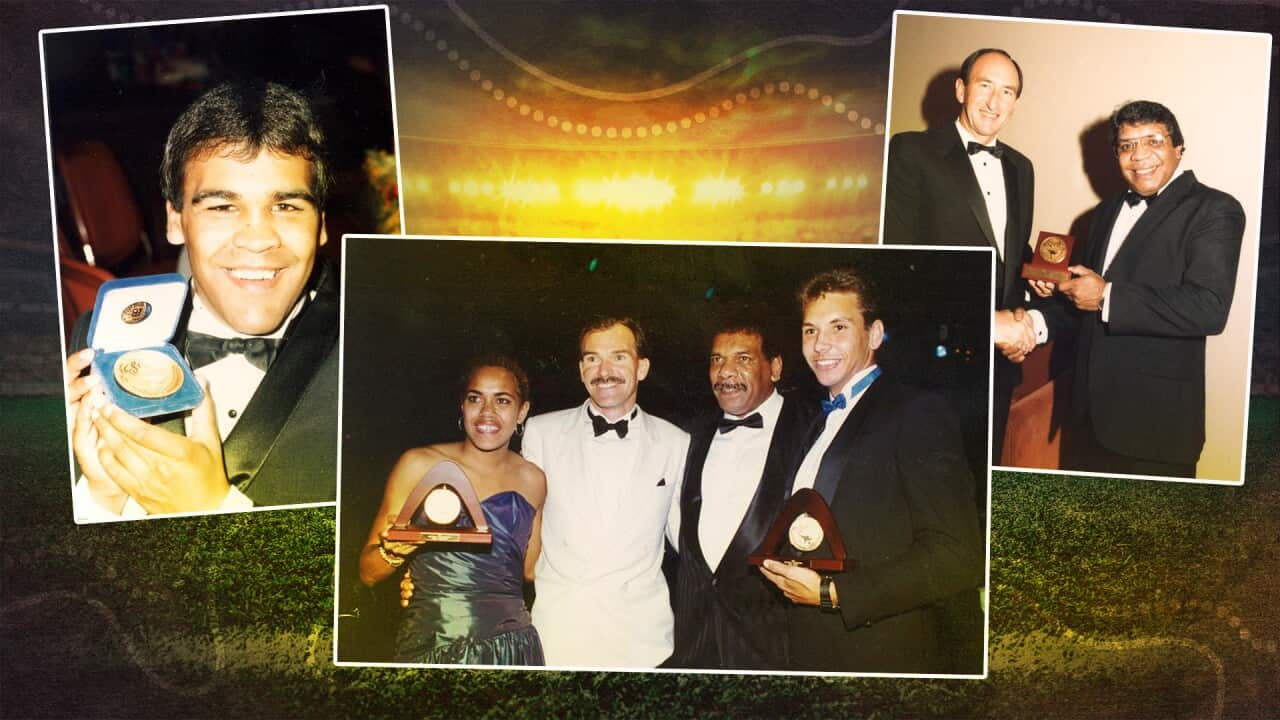The Arrenrnte and Kalkadoon leader Charles Perkins (1936–2000) knew there was no force more powerful in uniting Australians than sport.
For the former soccer player, sport had always been a vital part of life - and a tool for change.
Across the decades, many First Nations people have achieved success as runners, athletes and footballers, proving that it is possible to rise above barriers of systemic disadvantage and limited opportunity.
In the 1980s, Perkins, then head of the Commonwealth Department of Aboriginal Affairs (DAA), established the National Aboriginal Sports Awards to honour and celebrate the growing number of Indigenous sporting achievers at national and international levels.
In doing so, Perkins built on the work of the National Aboriginal Sports Foundation (NASF) - an organisation founded in October 1969 to discover, encourage and promote the sporting achievements of Aboriginal clubs and individuals across the country.
The inaugural NASF committee included prominent Aboriginal sportspersons selected for their expertise and leadership in their respective sports.
Its first Chairman (and later Patron) was Pastor Sir Doug Nicholls, a former VFL footballer and Governor of South Australia.
In its first decade, the Foundation distributed more than $1.1 million to around 1,000 Aboriginal sporting organisations and individuals.
It also helped stage over 100 sporting carnivals across Australia, supporting codes such as Australian Rules Football, Rugby League, Rugby Union, Cricket, Basketball, Netball, Tennis, Hockey, Darts, Athletics and Swimming.
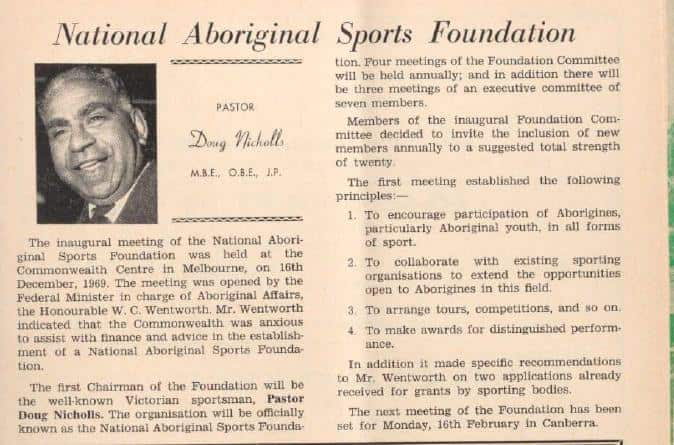
By the early 1980s, however, the Foundation struggled to secure sufficient funding to continue its programs, including sponsorship for multi-sport National Aboriginal Sporting Carnivals.
To boost support, former Foundation members proposed creating a National Aboriginal and Torres Strait Islander Sports Night to recognise Indigenous sporting excellence.
In 1985, they lobbied Perkins - then Secretary of the DAA - for assistance. He sought advice from Aboriginal staff, including Syd Jackson, a former Carlton VFL premiership player and Executive Officer of the Foundation.
Jackson strongly supported the idea, insisting the event would be both uplifting and groundbreaking:
“Few Australians have any appreciation of what Aboriginal Australians have achieved - and are achieving - in sport,” Jackson said at the time.
“It would be a great night for Black pride.”
Perkins tasked Jackson and Peter Windsor, a former journalist and head of the DAA’s Media Section, with developing a proposal for the inaugural National Aboriginal Sports Star Awards.
By early 1986, they presented a detailed plan recommending a biennial event recognising both state and national achievers. They also proposed establishing a National Aboriginal Sports Advisory Body to oversee nominations. Both past and present athletes were to be honoured, acknowledging the depth of Indigenous sporting talent.
Windsor later recalled that Jackson was adamant the event should be a black-tie affair, matching the prestige of other national sporting awards.
Perkins supported the proposal and secured approval from the then Minister for Aboriginal Affairs, Clyde Holding.
On September 6,1986, more than 300 guests filled the Grand Ballroom of the Hilton International Hotel in Adelaide to celebrate the remarkable contributions of Aboriginal men and women to Australian and international sport.
Never before had so many Indigenous sporting champions gathered in one place.
The guest list read like a Who’s Who of Australian sport - including Evonne Goolagong Cawley, Lionel Rose, and Graham “Polly” Farmer, the only Indigenous Australians then inducted into the nation’s Sporting Hall of Fame.
Other champions in attendance included Tony Mundine, Hector Thompson, Darby McCarthy, Glen Ella, May Chalker, Bertie Clarke, Andrea Mason, Mark Tutton, Phynea Clarke, Danny Morseau, Harry Williams, Treahna Hamm, Ted Kilmurray, Syd Jackson, the Krakouer Brothers (Jim and Phil), Stephen Michael, Maurice Rioli, Wilbur Wilson, Michael Graham, and VFL Grand Final umpire Glenn James.
Speaking at the inaugural event, Minister Holding noted the importance of establishing a National Aboriginal Sports Star Awards.
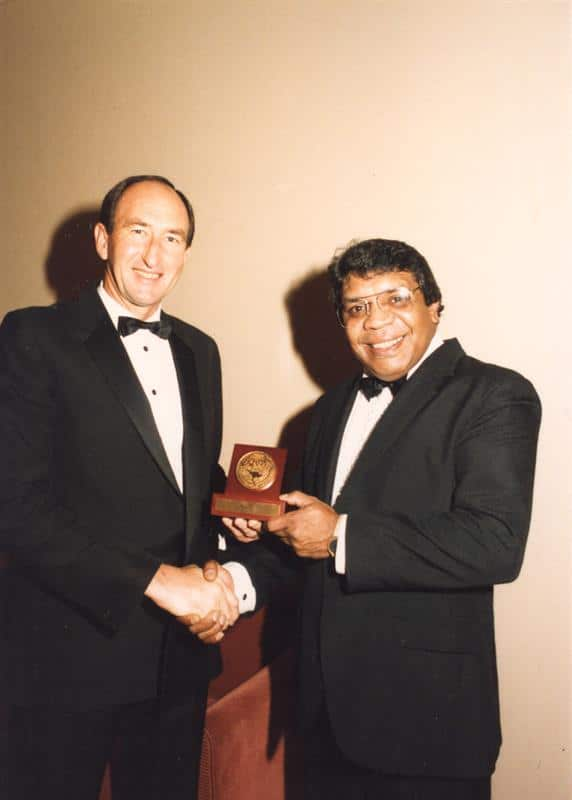
“Formal recognition of the big contribution made to Australian Sport by Aboriginals is long overdue,” he said.
Of the National Awards presented that night, Evonne Goolagong Cawley (Tennis) was named National Sportswomen, Lionel Rose (Boxing) was National Sportsman, Treahna Hamm (Judo) was named National Junior Sportswoman, David Ross (AFL) received the National Junior Sportsman Award.
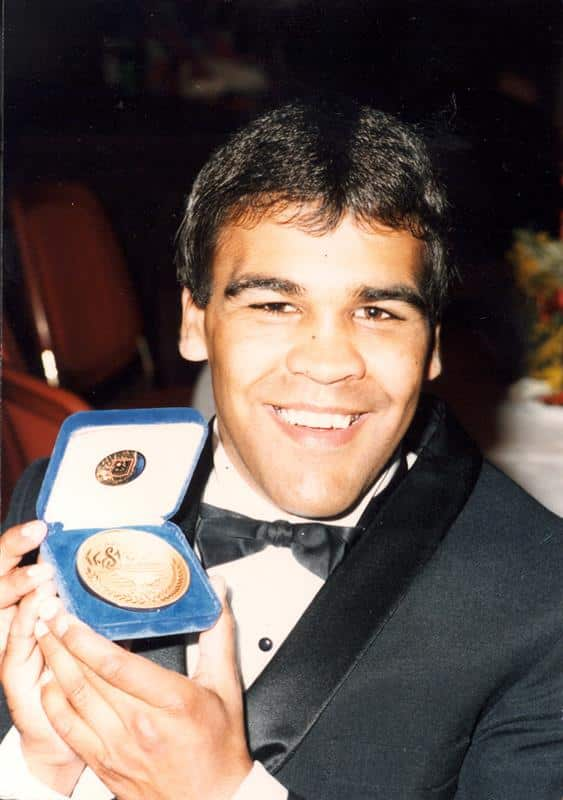
The gala was broadcast on delayed telecast by SBS, co-hosted by Justine Saunders and George Donikian. Entertainment included a performance by Ernie Bridge, Australia’s first Aboriginal government minister, and his sons, who sang a tribute to Goolagong Cawley. David Gulpilil and dancers from Ramingining also performed.
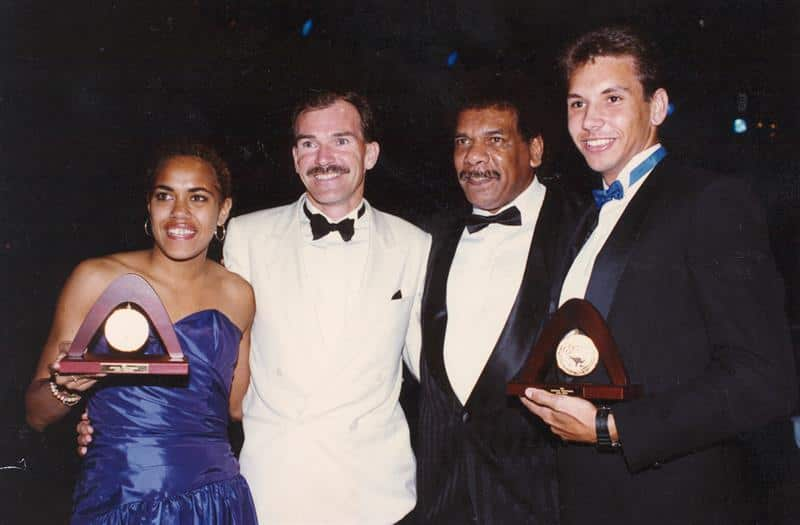
The Awards were held biennially in major cities including Brisbane (1988), Sydney (1991), Melbourne (1993), Darwin (1995), Perth (1997), Hobart (1999), Sydney (2001) and Adelaide (2003).
However, following the abolition of ATSIC in 2004, government support was withdrawn and the Awards were discontinued.
After nearly two decades, the legacy was revived. In 2023, backed by the newly formed National Indigenous Sports Foundation - launched in March 2022 - the National Indigenous Sports Awards returned.
The Foundation’s creation followed the National Indigenous Sports Summit in Melbourne in 2017, where stakeholders reaffirmed the need for a dedicated advocacy body to advance Indigenous sporting issues and representation.
The revitalised Awards were staged in Melbourne in 2023 and 2024, and will next be held in Brisbane on 15 November 2025.
Today, the National Indigenous Sports Awards continue to carry forward a proud legacy - one that celebrates Indigenous excellence, resilience, and the unifying power of sport.
